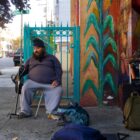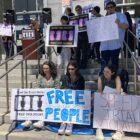On Tuesday’s ballot, Proposition D would create an exception to a 2002 voter-approved ordinance banning new general advertising. The measure would allow large, bright billboards that would have the option to include moving parts and video on two blocks of Market Street, between 5th and 7th streets. The signage on those two blocks would be regulated by the Central Market Community Benefit District.
Opponents are saying that this is just a new gambit to overturn the voters’ will from seven years ago. But because of the fine print — particularly paying for local arts education with some of the proceeds — it has attracted a broad array of supporters, some of them pretty unlikely allies.
Conservative groups like the SF Young Republicans, and the local Republican Party are backing the measure, but it’s also attracted the Democratic Party.
In an unusual alliance, self-described progressive leaders such as Supervisor David Campos and the former board president, Matt Gonzalez, also support the initiative. Neither Campos nor Gonzalez returned calls or e-mails on this issue.
On the No on D side, Milo Hanke, president of San Francisco Beautiful, said opponents had a budget about one-15th the size of their opponents’. He cited studies from Scenic America that correlate billboards with an increase in traffic accidents.
"Billboards are supposed to take your eyes away from everything else," Hanke said. "Diverting your eyes for two seconds, or more, is all it takes for accidents due to driver distraction."
Hanke said another study from the same group that corroborated his observation that billboards generally end up in poor people’s neighborhoods. Many billboards in San Francisco are illegal, and Hanke said they tend to concentrate in the most vulnerable neighborhoods.
If the proposition were to pass, most billboard owners would have to pay 40 percent of their ad revenue to a nonprofit that funds arts and education for youth. The San Francisco Bay Guardian pointed out that there would be no public input into how those funds are distributed, since the nonprofit is overseen by the businesses backing Prop. D.
The No on D side also has some unusual allies: The Chronicle and the Bay Guardian agreed that it should be voted down. Chronicle columnist C.W. Nevius cited a 2008 study by the Municipal Transportation Agency that three of the four most common intersections for vehicle-pedestrian collisions are near 6th and Market streets (though he wasn’t discussing Prop. D at the time, and actually endorsed D in another column).









